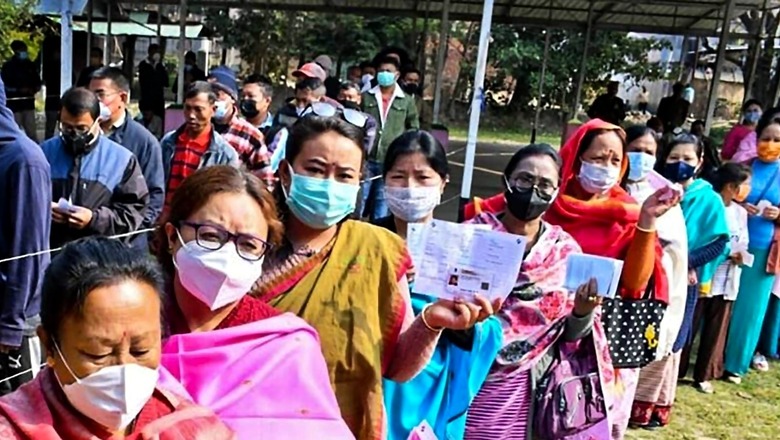
views
On the backdrop of the strong agitations in the Northeastern states to repeal the Armed Forces (Special Power) Act, 1958 (AFSPA) and realignment of the alliance between the political parties, the Assembly elections in Manipur were held in two phases on February 28 and March 5. Political pundits observed that the outcome of the Manipur Assembly elections would be an important ramification in Meghalaya and Nagaland, the two Northeastern states along with Tripura would go to the Assembly polls early next year. Manipur Assembly Election Result 2022 LIVE Updates here.
The ruling Bharatiya Janata Party (BJP) and its two estranged allies — National People’s Party (NPP) and Naga People’s Front (NPF) — fought the elections to the 60-seat Manipur Assembly separately. Over the two month-long elections campaign, the relations among the three parties worsened and each made allegations and counter allegations against one another.
Headed by Meghalaya Chief Minister Conrad K. Sangma, the NPP is the dominant party of the Meghalaya Democratic Alliance government, in which with two MLAs the BJP is the partner.
The NPF with 25 MLAs is a major ally of the United Democratic Alliance (UDA) led India’s first all party and opposition less government in Nagaland. With 21 members Nationalist Democratic Progressive Party (NDPP) and BJP with 12 MLAs, are the two important constituents of the UDA.
The NPP, a national party, NPF, NDPP led by Nagaland Chief Minister Neiphiu Rio and many other regional and state parties are the allies of the BJP-led anti-Congress alliance of regional parties — North East Democratic Alliance (NEDA), the Northeast unit of the National Democratic Alliance at the center.
Assam Chief Minister and BJP leader Himanta Biswa Sarma Sarma is the convener of the NEDA.
Sushanta Talukdar, a renowned political commentator in the Northeast region and a celebrity writer, said: “With the dwindling relations between the BJP and its allies in the Northeastern states, specially the NPF and NPP, there is bound to be a serious electoral ramification in the near future especially during the Assembly elections in Meghalaya and Nagaland in early next year.”
“The BJP wrested power in Assam (in 2016 and 2021), Manipur (in 2017) and Tripura (in 2018) with the support of the local and regional parties. The saffron party’s current relations with its several allies in the Northeastern states are very unpleasant,” Talukdar, the editor of multilingual online portal ‘Nezine’, told IANS.
During the election campaign, in a series of scathing attacks, Assam Chief Minister and BJP’s top strategist in the Northeast region Himanta Biswa Sarma mocked ally, NPP, saying no one in India knows the party and voting for its candidates in Manipur elections would be fruitless as the party has “no value”.
Sarma said that the Ministers from the NPP were earlier chosen in the Manipur government because of the BJP.
“The NPP has no government at the Centre. Why would you go to the central government through the NPP. If you install a BJP government in Manipur, then you would be able to go directly…” Sarma had said.
Development, militancy, illegal trade of drugs, repeal of the AFSPA, women’s empowerment, rising unemployment and corruption are the main issues highlighted by the political parties in their campaign.
In the run-up to the Manipur Assembly elections, the Northeast region’s dominant militant outfit Isak-Muivah faction of the National Socialist Council of Nagalim (NSCN-IM) has undertaken a campaign in the Naga-dominated areas of the state to make the people understand the importance of the ongoing talks with the Centre with reference to the 2015 Framework Agreement.
In another unprecedented development, the militant outfit Kuki National Organisation (KNO), who are under Suspension of Operation (SoO) with the government, announced support to all the candidates of the ruling BJP for the Manipur Assembly election.
President of KNO, P.S Haokip in a statement had said: “In line with the ongoing political dialogue between KNO and Government of India, the central government and ruling BJP leadership have promised swift settlement of Kuki political aspirations. Union Home Minister Amit Shah ji have announced the same in his public address on February 23 at Churachandpur public Ground.”
The opposition Congress strongly reacted to the development and urged the Election Commission to take appropriate and strong actions against the KNO outfit.
In a sensational revelation, former Union Minister and senior Congress leader Jairam Ramesh 48 hours before the second phase of elections claimed that around Rs 16.63 crore given to the banned militant groups under Suspension of Operation in Manipur and he alleged that “this is bribery to influence the voters in the poll-bound state”.
Ramesh, who is the election in-charge in Manipur on behalf of the Central Congress leaders, said that in a shocking and flagrant violation of the Election Commission’s Model Code of Conduct, the BJP government in Manipur released Rs 15,70,32,000 to banned militant groups under the Suspension of Operation on February 1.
He said another amount of Rs 92,65,950 was given to the banned militant groups on March 1 and both the payments have been released by the Union Home Ministry and made by the state government.
Regarding these payments, the Manipur Election Department referring to the reports of the state’s Home and Finance Departments said that these amounts are the outstanding stipend and financial benefits of the militant groups — Kuki National Organisation and United People’s Front — who are under Suspension of Operation deal with the government and the surrendered militants.
Besides many issues, the AFSPA, termed as a “draconian law”, has also dominated the election campaign in Manipur.
The main opposition Congress and all other local parties in Manipur after last December’s Nagaland incidents in which 14 people were killed in the firing of the security forces, have been strongly demanding to repeal the AFSPA.
The Congress leaders, including Jairam Ramesh and three-time (2002-2017) former Chief Minister Okram Ibobi Singh, questioned that when the BJP leaders in the state and the Centre, including the Prime Minister and Home Minister, claimed the law and order of the state had remarkably improved so why the AFSPA not being withdrawn?
In an interview with IANS, Manipur Chief Minister N. Biren Singh said that the Army is also not doing excessive action in Manipur, or meting out inhumane treatment to the people taking advantage of the AFSPA.
“You know the hostile situation in Myanmar. Considering all aspects, immediately we cannot withdraw the AFSPA. We are trying to lift the AFSPA and we are requesting the Centre in this regard and we — also as responsible people, are trying to create a conducive atmosphere so that the Centre would not extend it further in near future,” said Singh, who is the BJP’s Chief Ministerial face in the ongoing elections.
The main opposition Congress did not field candidates in five Assembly seats and political pundits opined that Congress in these five seats is tacitly supporting the candidates of NPP.
The Congress, which governed the state for 15 consecutive years till 2017, had formed a Manipur Progressive Secular Alliance after forging a pre-poll alliance with four Left parties and Janata Dal-Secular.
With four MLAs in the outgoing Assembly, the NPP, the dominant party of the Meghalaya Democratic Alliance government, has been an ally of the BJP in both the Northeastern states (Meghalaya and Manipur) since 2017, has put up 38 candidates while the BJP fielded in all the 60 seats in the Manipur elections.
Among the other major political parties, Janata Dal (United), which has put up 38 candidates out of the 60 seats, might play a vital role in government formation if they get a reasonable number of seats.
The BJP had bagged 21 seats in 2017 and came to power in the state for the first time, after stitching alliance with various parties including the NPP and the NPF.
Read all the Latest Politics News here



















Comments
0 comment